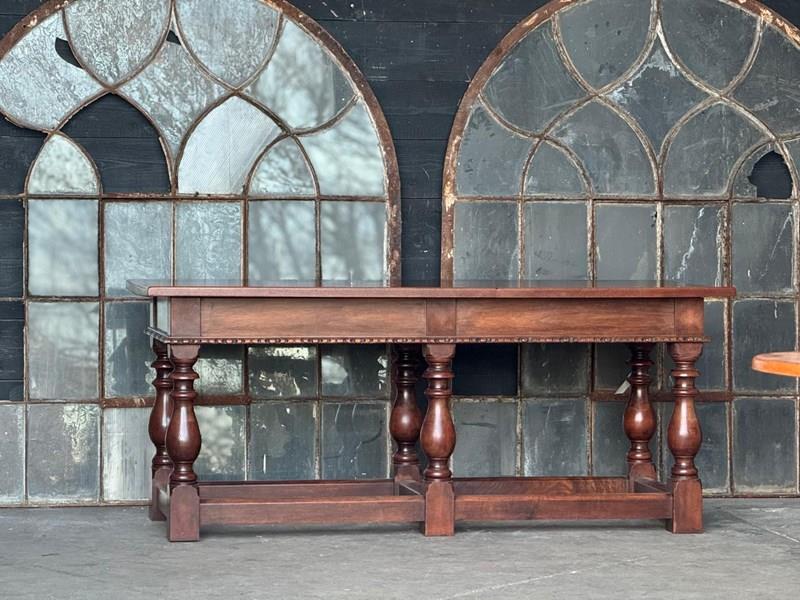The Hoarde Vintage - www.thehoarde.com
Sellers's Details
SUSSEX ANTIQUES AND INTERIORS
Tel:
Email: [email protected]
https://www.thehoarde.com/dealers/sussex-antiques-and-interiorsItem Details
A stunning Console Table by Marsh Jones Cribb & Co and important furniture maker in the 19th Century (see below). Made from Walnut and stunning quality. In excellent overall condition for the home.
Length 182 cm
Depth 74.5 cm
Height 77.5 cm
Please note this item is in France and not available for delivery until the end of January.
Marsh, Jones and Cribb
West Bar, Boar Lane and Basinghall Street, Leeds, Yorkshire; cabinet makers and upholsterers &c. (fl. 1864-1936)
John Marsh and Edward Jones bought John Kendell’s business at 10 West Bar in 1864 but did not acquire the Boar Lane premises until 1869. Kendell also had a London branch in Cavendish Square.
Henry Humphries Cribb, who had a furnishing business in Soho Square, London, sent his son to Marsh & Jones in Leeds to serve his apprenticeship. This son became a partner in the firm by 1872 and subsequently listed in directories as Marsh, Jones and Cribb.
Exhibitions included:
Yorkshire Exhibition of Arts and Manufactures (1875)
Exposition Universelle in Paris (1878): Talbert-designed carved oak sideboard with marquetry and carved panels (illus. Meyer, (2006) p. 258); mantlepieces and panelling. They were awarded a bronze medal for cheap & fancy furniture in Class 17
Yorkshire Exhibition (1879)
Yorkshire Fine Art Society, Leeds (1881): sequoia bedroom furniture
Industrial & Fine Art Exhibition, Bradford Technical School (1882): a suite of sycamore & gold furniture in the Ante Room of the Council Chamber, used as a boudoir for the Princess of Wales, and a rosewood suite in the Council Chamber, used as a reception room by the Princess. On the first floor gallery Marsh Jones & Cribb exhibited a dining room interior in Sheraton style. For their exhibits the firm was awarded a gold medal in Class III [The Furniture Gazette, 22 July & 23 December 1882].
Huddersfield Technical School Exhibition, 1883: sideboard, drawing room chairs and whatnots, and a bedroom suite in light wood
Arts and Crafts Exhibition (1890): Lethaby-designed furniture described by Ernest Gimson to Ernest Barnsley as ‘wonderful furniture of a commonplace kind’; including walnut cabinet inlaid, executed by A. Bowen and Thomas Word, inlay by E. Hooke (cat. no. 316); rosewood china stand, executed by Thomas Word (cat. no. 317); rosewood occasional table, executed by …… (cat. no. 322) and inlaid walnut coffer and bench, executed by A. Beaumont, inlay by E. Hooke (cat. no. 417).
By 1888 the firm had showrooms in Boar Lane and a factory in nearby Basinghall Street equipped steam-driven machinery. From Kendell the firm inherited the practise of labelling their furniture with the firm’s name, job number and workman’s name.
Their best known commission was for the industrialist Titus Salt, pioneer of the model industrial town of Saltaire. Most of the furniture was supplied in readiness for his marriage in March 1865 and was installed at Baildon Lodge, Baildon. The designer was Charles Bevan. Some of the furniture survives in the collection of Leeds Museums at Lotherton Hall, Yorkshire. The bills are extensively transcribed in Boynton, Furniture History (1967) and some of the furniture is also illustrated (pls 16-24). Another large commission was for Titus Salt jnr., for his house at Milner Field (1866).
The relationship with Bevan was an enduring one. Marsh & Jones were the makers of the new reclining chair registered by Bevan. This chair and an oak davenport inlaid with various other woods, also by Bevan, are illustrated in Gere & Whiteway (1993), p. 113. However, by 1867 Bevan was no longer associated with the firm and worked with other designers; the Jacobean dining room furniture illustrated in Bruce Talbert’s Examples of Ancient and Modern Furniture (1876) was made by Marsh, Jones and Cribb. To designs of W. R. Lethaby in the 1880s and 1890s, they made inlaid rosewood furniture; and for Heathcote, Ilkley, they made furniture designed by Edwin Lutyens, c. 1906.
Other public and church furniture commissions included:
St. Martin’s Church, Potternewton (April 1880): joinery work
St. John the Divine, Thorpe, Halifax (October 1880): joinery work
Leeds Public Library (July 1883 & April 1884): furnishings
Leeds & Yorkshire Architectural Society, Albion Street (September 1883): mantel and overmantel for the museum section of the building with furniture and fittings for the local new municipal offices with the carving work carried by Appleyard (January 1884)
Queensbury Church (May 1885): oak screen & choir stalls
Ultimately Marsh died and Jones then retired leaving Cribb on his own until A. I. Swift and E. J. Thompson (both formerly with Gillows of Lancaster) joined him c.1897. On 5 February 1905 the company was registered as Marsh, Jones and Cribb Ltd. Thompson retired in 1909, followed by Cribb and Swift in 1919, at which time the company was taken over by Mr Redman and Mr Fenton, and in 1923 by C. P. Sixsmith. In the 1920s the firm made ‘modern’ furniture, but also reproduced ‘Georgian’ and ‘Queen Anne’ designs. They acquired a reputation for high-quality shipboard furnishings; the liner Saturnia (launched 1927) was one of their commissions.
- Period: 1870s
-
- Price: £3,500.00
- €4,252 Euro
- $4,428 US Dollar
- Location: Sussex
-
- Dimensions: H: 77.5cm (30.51in)
- W: 182cm (71.65in)
- D: 74.5cm (29.33in)
